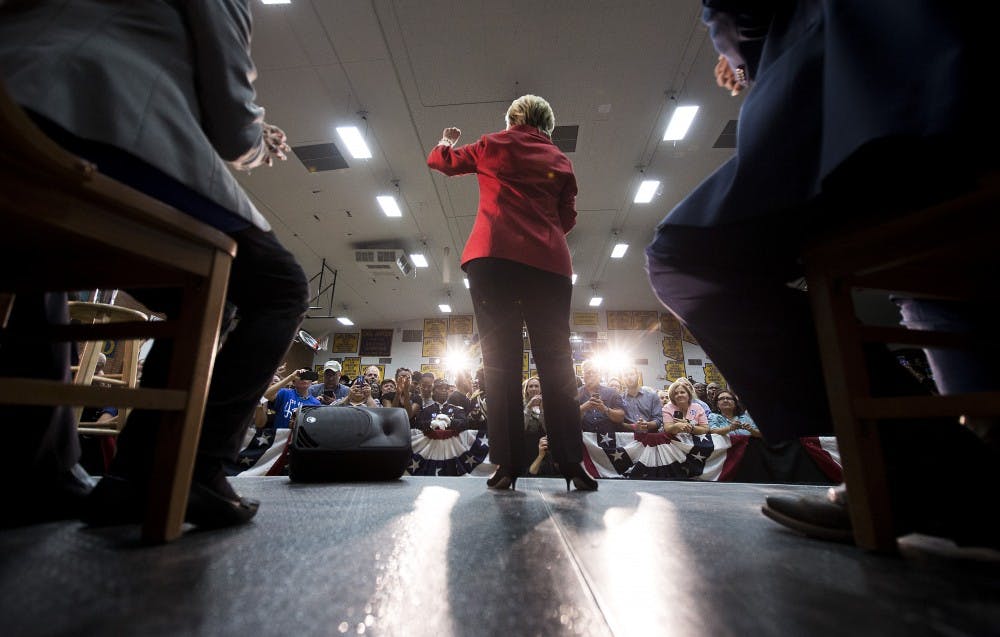In case you missed it, last night America tuned into a televised battle between bitter rivals that ended up being a little underwhelming.
So while it’s true that maybe the New Orleans Saints and Atlanta Falcons game wasn’t that great of a Monday Night Football production, there was also the first presidential debate of the 2016 election cycle, and it was decidedly more electric.
Donald Trump and Hillary Clinton met onstage last night at Hofstra University in Long Island, NY to duel each other in a debate on policy issues that, hopefully, voters care about. It’s a date that was marked on my calendar for some time, and although naturally I was stuck at work during the debate, I was able to stay up far too late and watch it on YouTube.
Right off the bat, I realized that the presence of Trump would make this debate almost unbearable to watch. I’m not talking about his policies or ideas, but mostly the fascinating way he constructs these long, run-on sentences that dip into a variety of topics unrelated to the question.
One of Lester Holt’s first questions to the candidates dealt with the racial fractures cracking across American society today. It was a solid question and one that Clinton answered extremely well. Clinton spoke about the importance of repairing police and community relations, the need to keep illegal firearms out of the inner-cities, while stressing that a majority of the police are good people looking for reform as well.
When the same question was posed to Trump, he immediately repeated the revived Nixonian phrase “Law and Order,” while talking about what a deplorable war zone some inner-cities are. Essentially, Trump took a question about inequality and discrimination and advocated tipping one side of the scale even more than it already is.
He brought up “stop and frisk” laws that “worked well in New York,” said Trump, but were found unconstitutional for “singling out black and Hispanic men,” according to Holt.
Trump’s response?
There it is, I thought, I only had to wait around 20 minutes for Trump to blatantly deny something that’s demonstrably true.
It got even better as the debate charged onward, as Trump began talking about how he was audited so much by the IRS and how “many other” wealthy people weren’t. Maybe, just maybe, the IRS has a vested interest in looking into the records of an individual that thinks not paying taxes makes him “smart.”
It was around this point that I noticed Clinton letting Trump just talk and how excellent of a strategy that was turning out to be. When Trump answers these debate questions, he just starts talking as if he’s pushing a snowball down a hill, hoping it doesn't annihilate the quaint mountain town at the bottom. The more linguistic rope Clinton gave him, the easier it was for Trump to hang himself with it.
Clinton used this strategy effectively and, despite a few cringe-worthy lines about “preparing to be president,” she performed strongly throughout the night. In my opinion, she was the hands-down winner of the debate as Trump seemed to rely more and more on his off-the-cuff remarks than solid answers to complex policy questions. I had staggeringly low expectations for Trump, all he really had to do was seem informed and prepared, and I'm not sure he met that standard.
Ashley Altmann, a journalism sophomore at ASU, agrees. She thinks Clinton won because "she was respectful."
"She didn't really interrupt Trump, whereas he would interrupt her," Altmann said, "I felt that she took responsibility for her actions and didn't blame it on anyone or anything else."
With a word limit, I can’t even begin get into other issues like Trump’s denial of his role in the birther movement, but overall, as the first big event in the third act of the 2016 election, this debate left me pretty much where I had been before.
I’m not thrilled about the candidates onstage; I have a choice between one I mostly agree with but am skeptical of and an unstable orange that somehow developed an elementary-level of command over the English language.
As a punctuation mark of this campaign, this debate wasn’t the period that we’re all desperately waiting for to signal an end to this election cycle. Instead, it was more like a dash — forcing me to take pause wondering if what follows is even going to be worth it.
In any case, Round 1: Clinton.
Reach the columnist at cjwood3@asu.edu or follow @chriswood_311 on Twitter.
Editor’s note: The opinions presented in this column are the author’s and do not imply any endorsement from The State Press or its editors.
Want to join the conversation? Send an email to opiniondesk.statepress@gmail.com. Keep letters under 300 words and be sure to include your university affiliation. Anonymity will not be granted.
Like The State Press on Facebook and follow @statepress on Twitter.




